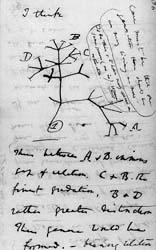Understanding complex ecological systems : How Darwin still guides us in 2009
Glenn Iason
Principal Ecologist
When Charles Darwin formulated his ideas on the origin of species, he was subject to criticism and ridicule, as his views represented an alternative to creationism. However, not only did he radically suggest that organisms, each with their own specialisms for a particular niche, evolved from others, but he also formulated precise hypotheses concerning how this came about, namely natural selection. Although ecology is a mathematically and experimentally rigorous science, the complexity of natural systems, with multiple interacting components (species), makes them difficult to model and to predict. The Darwinian principles of natural selection remain highly relevant to modern ecological research, and represent the most pervasive means of ordering and predicting the responses of the species components of natural and semi natural systems. For example, an understanding of the evolutionary relationships among species, and the extent to which their biology is genetically determined and ‘hard wired’, or varies with the environment, facilitates an approximation of how they might respond to a changing environment. And this is true whether the change is a rapidly imposed land-use change or a gradually changing climate. If we are asked to predict how a changing environment will affect a resident species, then Darwin’s theory provides a practical basis for addressing the problem. We would first ask, what are the species food and environmental requirements, and will they be maintained, is that species or a related species living in a similar environment elsewhere, will it adapt to the new environment?
 Darwin originated the often used analogy of the ‘tree of life’ which depicts the inter-dependence and evolution of species. However, his attention as a natural historian was not only directed towards the origin of species, he was also interested in earthworms, and more importantly, their effects on the environment. In his book The Formation of Vegetable Mould through the Action of Worms with Observations on Their Habits (1886) he states ‘….a weight of more than ten tons of dry earth annually passes through their bodies and is brought to the surface on each acre of land; so that the whole superficial bed of vegetable mould passes through their bodies in the course of every few years. It may be doubted whether there are any other animals that have played so important a part in the history of the world as these lowly organized creatures’. He clearly recognised the importance of ecosystem function, studies of which are currently enjoying resurgence 200 years after his Birthday.
Darwin originated the often used analogy of the ‘tree of life’ which depicts the inter-dependence and evolution of species. However, his attention as a natural historian was not only directed towards the origin of species, he was also interested in earthworms, and more importantly, their effects on the environment. In his book The Formation of Vegetable Mould through the Action of Worms with Observations on Their Habits (1886) he states ‘….a weight of more than ten tons of dry earth annually passes through their bodies and is brought to the surface on each acre of land; so that the whole superficial bed of vegetable mould passes through their bodies in the course of every few years. It may be doubted whether there are any other animals that have played so important a part in the history of the world as these lowly organized creatures’. He clearly recognised the importance of ecosystem function, studies of which are currently enjoying resurgence 200 years after his Birthday.
|
Updated: 23 Jan 2024, Content by: CN
|



